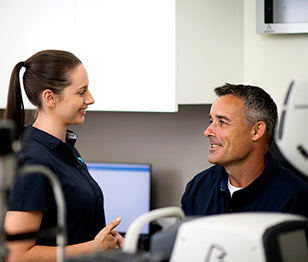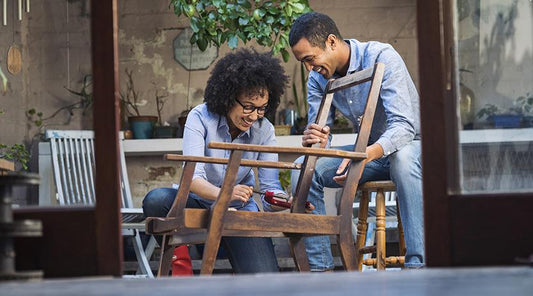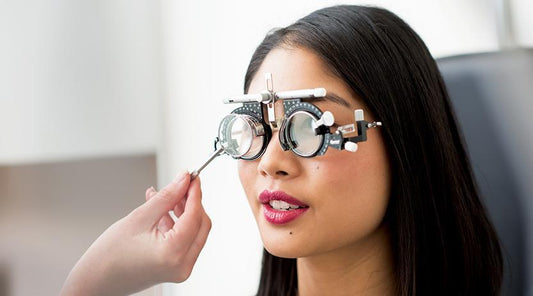Age and vision changes

We can’t help getting older - and as we age our eyes do too. So it’s important to make sure we’re keeping our eyes healthy and looking for the signs of a few more common conditions.
“The anatomy of the eye changes from birth onwards,” explains Bupa optometrist Karen Makin. “Once you’re over 40 structural changes to the crystalline lens of the eye happen as well, and that has a big effect.”
Here are some eye conditions that can come with age.
Presbyopia
Presbyopia comes from the Greek word for ‘old eye’ – and it’s the natural process where eyes lose the ability to see things up close after the age of 40.

“Needing more light [than you used to], having difficulty doing close work and finding your arms aren’t quite long enough when you’re holding a book or your phone are signs that presbyopia is happening and you probably need some reading glasses,” explains Makin.
Floaters and flashes
We have something called the vitreous – a gel-like substance that helps the eye maintain its shape. And as we age, it starts to shrink and get thinner. Sometimes it may stick to the retina and pull hard enough to tear it (known as retinal detachment).
Some signs to look for include flashing lights or floaters (small specks, lines or cobwebs in your field of vision). If you notice them, get in to see an optometrist immediately.
That said, “flashes and floaters can also be signs of vitreous detachment, where the gel inside the eye pulls on the retina, which is okay and not unexpected in middle age,” Makin says. It’s always best to double check with your optometrist.
Dry eyes
This one’s pretty self-explanatory - sometimes we don’t have enough tears to keep our eyes well lubricated and healthy. This is more likely to happen after age 50.

They can be uncomfortable, but if you don’t try and treat them, dry eyes can affect your vision. Drinking plenty of water, wearing sunglasses outside and blinking regularly when reading or looking at screens for long periods can all help ease symptoms (but aren’t a replacement for treatment - so make sure you check in with your optometrist)
More serious age-related eye changes
Some vision changes with age can mean there’s something more serious going on, so book in to see your optometrist if you notice:
- You've lost side or peripheral vision. “That may be a sign of glaucoma,” says Makin. Glaucoma is a degenerative condition that affects the optic nerve and can lead to blindness.
- You have distorted vision. “This may indicate macular degeneration,” she says. A progressive disorder, macular degeneration affects the part of the retina associated with focus and detail, and it’s the leading cause of vision loss and blindness in Australia.
- You've noticed a change in your colour perception. “This could be cataracts,” says Makin. A cataract, which tends to affect people aged over 65, is a clouding and hardening of the lens of the eye. Over time, it decreases vision and may affect colour perception.

We're here to help
Eye problems may become more likely as you age, but many of them can be corrected or treated if picked up early. It’s essential to get your eyes checked every two years – book an appointment today.
You might also like to read...
View all-
Do I need an eye test?
Having regular eye tests can help identify and solve any vision problems, and they're a great way to get ahead of any underlying issues.
Eye testDo I need an eye test?
Having regular eye tests can help identify and solve any vision problems, and they're a great way to get ahead of any underlying issues.
Read more -
What should I expect during my eye test?
When you first have an eye test, your optometrist will get the lowdown on your eyes, vision, health and lifestyle in order to tailor the test to you.
Eye testWhat should I expect during my eye test?
When you first have an eye test, your optometrist will get the lowdown on your eyes, vision, health and lifestyle in order to tailor the test to you.
Read more -
Eye tests and out-of-pocket expenses
Worried about the costs of getting your eyes tested? We’ve got good news. They’re usually bulk-billed if you’re covered by Medicare.
Eye testEye tests and out-of-pocket expenses
Worried about the costs of getting your eyes tested? We’ve got good news. They’re usually bulk-billed if you’re covered by Medicare.
Read more





